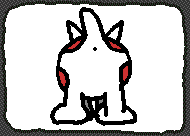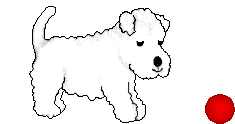|
Training
Housetraining
Avoid common mistakes!
- Never rub the puppies nose in it! Why? If you rub the puppies nose in poop he is going
to have to be cleaned up, and guess who will be the one that will have to clean it up (smile). The real reason is because
it will horrify him, and he will either think pooping is wrong, and hide the next time he goes, or he may decide
it smells good enough to eat! OOOH NOO!
- Don't yell at the puppy long after the fact! If you didn't catch the puppy pooping
it's too late to yell. Puppies have short memories and won't know what you are yelling at them for and will become frightened.
Would you yell at your child for pooping in his pants? Don't answer that! Just clean it up, it's your fault
anyway because you weren't watching him closely enough.
- Don't spank that little fellow, he's just a baby! He is learning something
new, in a new place, with new people! If you hit your puppy he will become fearful of you, he won't respect you,
he will be scared of you! When puppies are afraid, they cower, they whine, and they have more accidents! And it will
be your fault for spanking him! Just pick up the poop carry it outside to his spot and take puppy with you. He will soon understand
if you will be patient and consistent!
Just be patient, consistent, and use a crate. Don't let him run loose
in the house unless you are watching every move, I said "every move", at least until he is trained!
Tips for successful housetraining
- Learn the signs your puppy gives when he's gotta go! Warning signs:
squatting(duh), whining, pacing back and forth, sniffing(usually in circles), whining, and flatulence(pooting). If he
is doing any one or any combination of the signs, you better be moving to get him outside, he's gotta go!
- Take him to the same spot each time. Smelling previously soiled areas has a way of stimulating
the puppy to go again. I know it's hard to believe but, really it does! It's kinda like when humans hear running water
and suddenly they have to pee!
- Use a command word or phrase! You won't believe this, but you can actually teach your pup to poop
on command with a single word or two! Go potty, do your business, go poop, potty time, whatever you choose! Just don't choose
a word or phrase that might be used casually like let's go, or time to go, because it could backfire on you!
- Praise, Praise, Praise!!! They can't get enough of this! Praise highly, make a big deal out
of it! You know how it feels when someone appreciates your efforts! Puppies like praise and appreciation too! So
give lots of it, and be sincere, they can tell when it is fake!
- Offer favorite treats! Treats can accelerate the process in some cases
but they can also hamper the progress. One thing a puppy learns quickly is "go poopy, get treaty" My puppy would
run outside to her spot, do the job, and fly back up to me to get her treat! Make sure your puppy is finished,
and don't give him a treat unless he gets the job done! It will defeat the purpose! And trust me they learn to pretend
to go potty to get the treat! So watch out for the smarty pants!
- Keep puppy focused! Don't confuse playtime and potty time! This is a common mistake! Poop
first, then go back inside, then if you want to take him out to play, go ahead. Other than your command word, talk very
little until task is complete, then praise, praise, praise. ADD is common in puppies as well as in young boys! Well,
I don't think there is actual research proving my theory, but it sure seems very familiar!
- You can limit water and food at nighttime. Don't be drastic about this, be realistic. Maybe, nothing
after 9pm, that seems reasonable. Kinda like having a health screening test when you are in the hospital or Dr. Office, nothing
by mouth after midnight for humans. If he seems thirsty, try letting him lick an ice cube.
- Clean up soiled areas promptly and with a cleaner made especially for removing pet odors if he
has an accident in the house. Remember, smelling previously soiled areas can stimulate another accident! UH OH!
- Don't allow him to roam freely! Limit the area puppy is allowed to roam unless you are watching
every move he makes. ( Did I say every move again? ) Use crates ( crate training is good, better, best ),
baby gates, or any other confined area that has been puppy proofed to keep puppy safe and you sane during the house training
period.
- Most of all be consistent! Schedule, schedule, schedule! Take your pup out first thing
in the morning, even before you get your coffee. Take him after each nap, each feeding (15-20 minutes after),
before bedtime, after certain activities (you'll learn what stimulates him), and when he displays a warning
sign. It may be a false alarm, but it's better to be safe than sorry! See demonstration below.
| OOps! I bet he tried to warn you! |

|
|
 |
You must vaccinate!
| Don't listen to this pup! He's afraid of needles! |

|
| " say no to shots, say no to shots!" |
Puppies should be vaccinated at 6 weeks and then in 3 week intervals. Vaccinations protect your puppy from infectious
diseases and viruses. These diseases can be debilitating, and even life threatening to your puppy.
Some of the most common diseases that vaccinations protect your puppy from aquiring are:
- Parvo-a virus that is the most serious threat to puppies lives. Parvo has a high mortality
rate even with hospital care. Symptoms of Parvo include: high fever, vomiting and diarrhea.
- Distemper-a highly infectious disease that causes symptoms like Parvo but also include
dull coat and eyes and listlessness. If puppies recover they may have permanent blindness, deafness or impaired sense
of smell.
- Hepatitis-usually fatal because of quick onset. Pain is a symptom that appears
suddenly and death ensues within hours.
Be very cautious where you allow your puppy to play and visit until he has had his full
series of vaccinations. He could pick up infectious diseases from stool, saliva, viruses in the air, fleas,
mosquitoes and other dogs or puppies. Keep your puppy in a crate or your arms when visiting the vet or pet supply
stores, and avoid contact with other dogs. Avoid puppy parks where he will be exposed to stool and other dogs. This
will help keep him safe until he's been fully immunized.
|
 |
 |
 |
|

About Chewing!
First of all puppies have to chew. They are just like people babies, they teethe! It hurts, they chew! They also chew
out of boredom, what else can they do besides sleep?
Here are a few tips to help manage and prevent chewing:
- Provide plenty of chew toys. Nylon bones, hard rubber toys, and rope toys work well. There is also a toy that you
can put a treat inside, that he works on getting out, that will entertain him for awhile.
- Redirect, redirect, redirect!Redirect your puppy to his own toys with a sharp "No" whenever he chews something
off limits.
- Put your puppy in his crate. Anytime you can not watch your puppy's every move, crate him. It's for his safety and
your peace of mind!
- Remove dangerous or valuable items out of reach. Move house plants(some are toxic), books, furniture, clothing, shoes,
trash, electric cords, anything that can be chewed or cause harm to your puppy.
- Don't give him old shoes or socks for toys. Unless you want him to chew your new ones too! He will not discriminate from the
new and the old, only that it is good to chew.
- Use commercial sprays that can be applied to furniture legs to make it distasteful for your puppy. I also read that
Listerine would work, but be careful with these products, they may take off paint or stain. Test first!
- Give your puppy plenty of love, attention and excersise. Puppies that are given lots of attention and
excersise don't get quite so bored, thus, less chewing.
Spend time with your puppy, kiss and hug your puppy, learn his habits, and watch him like a hawk until you have trained
him well!

|
| An excerised dog is a good dog! So, Play with your pup often! |
|
 |
 |
 |
|
|
 |
|

